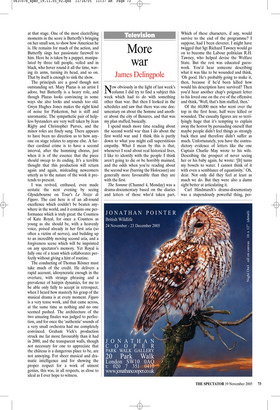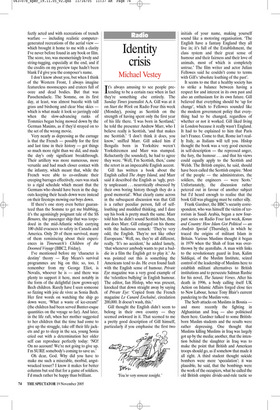More war
James Delingpole
Now obviously in the light of last week’s column I did try to find a subject this week which had to do with something other than war. But then I looked in the schedules and saw that there was one documentary on about the Somme and another about the city of Benares, and that was my plan stuffed, basically.
I spend much more time reading about the second world war than I do about the first world war and I think this is partly down to what you might call superstitious empathy. What I mean by this is that, whenever I read about real historical lives, I like to identify with the people I think aren’t going to die or be horribly maimed, and the odds when you’re reading about the second war (barring the Holocaust) are generally more favourable than they are with the first.
The Somme (Channel 4, Monday) was a drama-documentary based on the diaries and letters of those who’d taken part. Which of these characters, if any, would survive to the end of the programme? I suppose, had I been cleverer, I might have twigged that Sgt Richard Tawney would go on to become the Labour politician R.H. Tawney, who helped devise the Welfare State. But the rest was educated guesswork. You’d hear someone describing what it was like to be wounded and think, ‘Oh good. He’s probably going to make it, then, because if he’d been killed how would his description have survived? Then you’d hear another chap’s poignant letter to his loved one on the eve of the offensive and think, ‘Well, that’s him stuffed, then.’ Of the 60,000 men who went over the top in the first hour, half were killed or wounded. The casualty figures are so terrifyingly huge that it’s tempting to explain away the horror by persuading oneself that maybe people didn’t feel things as strongly back then and therefore didn’t suffer as much. Unfortunately, you have the contradictory evidence of letters like the one Captain Charlie May wrote to his wife. Describing the prospect of never seeing her or his baby again, he wrote: ‘[It] turns my bowels to water. I cannot think of it with even a semblance of equanimity.’ Oh, dear. Not only did they feel at least as much we do. But they were also a damn sight better at articulating it.
Carl Hindmarch’s drama-documentary was a stupendously powerful thing, per fectly acted and with recreations of trench warfare — including realistic computergenerated recreations of the aerial view which brought it home to me with a clarity I’ve never before found in any book or film. The score, too, was mesmerisingly lovely and string-tugging, especially at the end, and if the credits on my preview tape hadn’t been blank I’d give you the composer’s name.
I don’t know about you, but when I think of the Western Front, I always imagine featureless moonscapes and craters full of ooze and dead bodies. But that was Passchendaele. The Somme, on its first day, at least, was almost bucolic with tall grass and birdsong and clear blue skies which is what made it look so jarringly odd when the slow-advancing ranks of Tommies began being mowed down by the German Maxims, as if they’d strayed on to the set of the wrong movie.
Very nearly as depressing as the carnage is that the French — possibly for the first and last time in their history — got things so much more right than we did, and made the day’s only significant breakthrough. Their artillery was more numerous, more versatile and had much closer contact with the infantry, which meant that, while the French were able to co-ordinate their creeping barrages effectively, ours was stuck to a rigid schedule which meant that the Germans who should have been in the dugouts keeping their heads down were instead on their firesteps mowing our boys down.
If there’s one story even better guaranteed than the Somme to get me blubbing, it’s the agonisingly poignant tale of the SS Benares, the passenger ship that was torpedoed in the mid-Atlantic while carrying 100 child evacuees to safety in Canada and America. Only 20 of them survived, many of them reminiscing about their experiences in Timewatch’s Children of the Doomed Voyage (BBC2, Friday).
I’ve mentioned before my ‘character is destiny’ theory — Ray Mears’s survival programmes are big on this; so, too, I remember from my George Eliot, is Novalis, whoever he is — and there was plenty to support it here, most notably in the form of the delightful (now grown-up) Bech children. Rarely have I seen someone so fizzing with joie de vivre as Sonia Bech. Her first words on watching the ship go down were, ‘What a waste of ice-cream!’ (the children had been served Bunter-esque quantities on the voyage so far). And later, in the life raft, when her mother suggested to her children that the time had come to give up the struggle, take off their life jackets and go to sleep in the sea, young Sonia cried out with a determination her older self can reproduce perfectly today: ‘NO! On no account! We’re not going to give up. I’m SURE somebody’s coming to save us.’ Oh dear, God. Why did you have to make me such a miserable, morbid, angstwracked tosser? I know it makes for better columns but sod that for a game of soldiers. I’d much rather be happy than brilliant.


























































 Previous page
Previous page